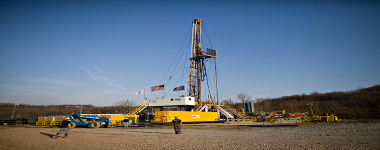Guest Post by Abrahm Lustgarten, ProPublica.org
The U.S. Department of Justice is investigating how Chesapeake Energy (CHK) pays landowners for the natural gas it drills on their property, according to disclosures made earlier this month in the company’s filings with the Securities and Exchange Commission.

The probe comes after years of complaints by landowners that they are being underpaid, and an investigation by ProPublica
, which found the company was using the fees it had been been paying those landowners to repay billions of dollars of hidden corporate debt instead.
Chesapeake received subpoenas about its royalty practices from the federal government and several states, the company stated Nov. 6. The company did not respond to a request for comment from ProPublica.
In lawsuits filed in several states, Chesapeake has been accused of inflating its operating expenses and then deducting those expenses from the share of income it pays for the right to drill on peoples’ land. Chesapeake has paid hundreds of millions of dollars in judgments and to settle some of these cases.
In mid-2013, landowners in Pennsylvania who had leased their gas rights to Chesapeake saw the payments they were receiving abruptly slashed by as much as 97 percent. In some cases checks for thousands of dollars a month were replaced with payments for less than a dollar. Those early complaints prompted a probe by Pennsylvania’s Attorney General and a letter from the state’s governor, Tom Corbett, to Chesapeake’s chief executive calling the practices “unfair and perhaps illegal.”
A an investigation by ProPublica
in payments to a series of complicated corporate transactions, worth nearly $5 billion, in which Chesapeake sold its pipelines for an inflated price, but then signed long-term contracts to pay the pipelines’ new owner exorbitant fees to continue to use them. While Chesapeake raised billions through the sale, it committed to repay all of that money and more in fees. The fees Chesapeake paid to the new company, called Access Midstream Partners, were then charged back to landowners, erasing much of their share of the economic bounty from the surge in natural gas drilling in the Marcellus Shale. At the same time that landowners’ gas income dropped, Chesapeake was attempting to raise cash to rescue itself from enormous and mounting corporate debt.














Leave A Comment